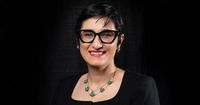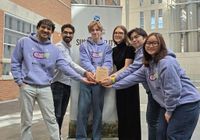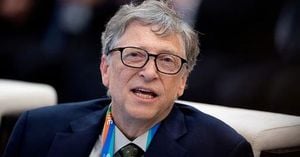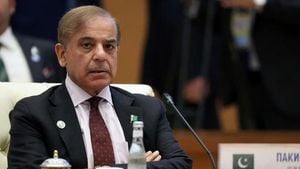On April 17, 2025, McMaster University celebrated the innovative spirit of its faculty as it announced that twenty-seven members received seed funding through the International Initiatives Micro-Fund (IIMF) to support international research collaborations. This initiative, spearheaded by the Office of International Affairs, invited proposals that exemplified innovation, partnership, and a strong commitment to internationalization.
The selected projects highlight a diverse range of disciplines and approaches, all united by a common goal: to foster inclusive and sustainable initiatives that benefit both local and international communities. The recipients of this year’s funding come from various fields including business, humanities, social sciences, science, engineering, and health sciences.
Among the recipients, Berk Gorgulu from the Business faculty received funding for his project titled "Simultaneous Disease and Specimen Pooling in Infectious Disease Testing." This research aims to enhance testing methods that could lead to more efficient disease management.
Manish Kacker, also from Business, will investigate "Distribution Channel Design and Management for Inclusive Access and Growth in Developing Economies," focusing on how to improve access to essential goods and services in underserved regions.
Milena Head, another Business faculty member, is set to explore "International Collaborations to Expand Aging Related Research Growth in Developing Economies," emphasizing the importance of aging research in a global context.
In the realm of generative AI, Yao Yao will conduct a study on "Generative AI in HRM: A Study on HRM Professionals’ Experiences and Perceptions," which aims to understand how HR professionals perceive and utilize AI technologies in their work.
Shifting to the humanities, Dilyana Mincheva’s project, "Archival Research and Academic Screenwriting: Investigating Interfaith Lifeworlds in the Cold War Balkans," promises to delve into the complex narratives of interfaith interactions during a tumultuous period.
Lucy El-Sherif will focus on "Looking for Palestine: Edward Said and Arab Youth Subjectivity," exploring the cultural and political narratives that shape the experiences of Arab youth today.
Christina Baade’s project, "Hearing Maternity: Developing an International Research Network on Music, Sound, and Maternity," aims to create a global network that investigates the connections between music, sound, and motherhood.
From the social sciences, Jarita Greyeyes will research "Understanding Indigenization: Perspectives from Indigenous Academic Leaders," providing insights into the experiences and challenges faced by Indigenous scholars.
Tommy Wu’s project, "A Comparative Analysis of Food Delivery Workers in Toronto and New York City," will examine the working conditions and experiences of food delivery workers in two major urban centers.
Netina Tan is set to analyze "Digital Authoritarianism and Non-State Actors in Africa and Asia," a critical examination of the intersection between technology and governance.
Victor Satzewich’s project, "‘At Wars End? Ukrainian Displaced Persons in Canada, Poland and Germany," will explore the ongoing impact of conflict on displaced populations.
Andrew Roddick’s funding will support a project titled "A Photogrammetry Reappraisal of Formative Sculptural Tradition," which aims to utilize advanced imaging techniques to reassess historical artifacts.
In the field of science, Gillian Goward will build an "International Network of Battery Researchers," focusing on collaboration to advance battery technology.
Graham Scott will investigate "Physiological Mechanisms of Adaptation in High-Altitude Mice," shedding light on how certain species adapt to extreme environments.
Ryan Cloutier’s project, "Characterizing the Dominant Drivers of Planet Evolution around Young M Stars," will explore planetary formation processes.
Shui Feng will focus on "Bayesian Nonparametric Inferences," a statistical approach that could enhance data analysis in various fields.
Rodrigo Narro Pérez’s research will involve "Glacial Landsystem Analysis in the Vilcabamba Mountain Range, Southern Perú," aiming to understand glacial dynamics in a changing climate.
Engineering projects include Kanwarpal Singh’s "Demystifying Acute and Chronic Intestinal Inflammation with Spectroscopic Cellular Optical Coherence Tomography (sc-OCT)," which seeks to improve diagnostic methods.
Heather Sheardown will work on "Development of Novel Combination Therapy for the Treatment of Myopia," addressing a common vision issue.
Saiedeh Razavi’s project, "Cooperative Planning in Lean Construction through Ethical, Safe, and Responsible Use of AI," aims to integrate AI into construction practices.
Telex M. N. Ngatched will explore "Optical Wireless Communication for Space-Air-Ground Integrated Network in 6G," focusing on the future of communication technology.
Onaizah Onaizah’s project, "Magnetic Tracking for Localization of Magnetic Continuum Robots for ENT Surgery," aims to enhance surgical precision.
In health sciences, Mohit Bhandari’s research will measure "The Creative Potential of Surgeons: A Mixed-Methods Cohort Study," evaluating the impact of creativity in surgical practices.
Waliul Khan will pilot a study on the "Impact of Common Food Dyes on Human Gut Health in Bangladesh," addressing a significant public health concern.
Margaret Fahnestock’s project will investigate "BDNF Isoforms and Pro BDNF Biology and Regulation," contributing to our understanding of brain health.
Deborah Sloboda will research the "Characterizing the Impacts of Maternal BMI on Placental Structure, Perfusion, & Inflammation," a critical area of maternal-fetal health.
Finally, Ivona Kučerová will tackle the issue of accessibility in her project, "Closing the Digital Divide: Accessibility, Employability, and Safety," which aims to improve digital access for marginalized communities.
The Office of International Affairs congratulates all recipients and looks forward to the impact of these innovative projects on global communities. Information about the next IIMF call for applications is available on the university's website.
In a related celebration of academic excellence, the University of Calgary's Students’ Union (SU) announced on April 16, 2025, the winners of the annual Teaching Excellence Awards (TEA). This year, 41 exceptional educators were honored for their commitment to student success, with nearly 1,000 nominations received from students.
The awards recognize professors, instructors, and teaching assistants who have made a lasting impact on their students. The selection process was entirely student-driven, emphasizing the importance of student feedback in recognizing teaching excellence.
Among the winners, Dr. Safaneh Mohaghegh Neyshabouri received the prestigious Hall of Fame Award, while Dr. Jessalyn K. Holodinsky and Dr. Meaghan Edwards were recognized with the Cumming School of Medicine Award. Other notable recipients include Dr. Kaarina-Nancy Bauer, Dr. Kim-Lee Tuxhorn, Kathleen Hughes, and Prof. Brandon Carroll, who each received the Faculty of Arts Award.
The Faculty of Kinesiology also saw recognition for Dr. Leigh Gabel and Dr. Kellinde Wrightson, while Dr. Michelle Scott Paul took home the Faculty of Nursing Award. Dr. Annie Quinney and Janet Leahy were honored with the Faculty of Science Award, and David Irvine received the Faculty of Social Work Award.
The SU’s commitment to recognizing teaching excellence extends beyond awards; they will donate $5,000 to the Taylor Institute for Teaching and Learning to support the professional growth of instructors. This investment aims to foster an environment where high-quality teaching becomes the standard.
Since 1975, the SU has celebrated teaching excellence at the University of Calgary, evolving the awards into their current format in 1984. The awards not only recognize outstanding educators but also aim to enhance the overall quality of education at the university.
For more information about the SU TEA program, students and faculty are encouraged to visit the SU’s official website.








